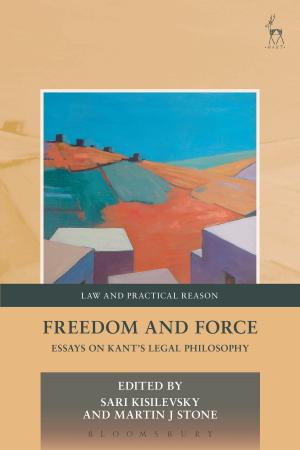| Author: | Dr Stefano Bertea | ISBN: | 9781847317254 |
| Publisher: | Bloomsbury Publishing | Publication: | October 6, 2009 |
| Imprint: | Hart Publishing | Language: | English |
| Author: | Dr Stefano Bertea |
| ISBN: | 9781847317254 |
| Publisher: | Bloomsbury Publishing |
| Publication: | October 6, 2009 |
| Imprint: | Hart Publishing |
| Language: | English |
This book focuses on a specific component of the normative dimension of law, namely, the normative claim of law. By 'normative claim' we mean the claim that inherent in the law is an ability to guide action by generating practical reasons having a special status. The thesis that law lays the normative claim has become a subject of controversy: it has its defenders, as well as many scholars of different orientations who have acknowledged the normative claim of law without making a point of defending it head-on. It has also come under attack from other contemporary legal theorists, and around the normative claim a lively debate has sprung up. This debate makes up the main subject of this book, which is in essence an attempt to account for the normative claim and see how its recognition moulds our understanding of the law itself. This involves (a) specifying the exact content, boundaries, quality, and essential traits of the normative claim, (b) explaining how the law can make a claim so specified, and (c) justifying why this should happen in the first place. The argument is set out in two stages, corresponding to the two parts in which the book is divided. In the first part, the author introduces and discusses the meaning, status, and fundamental traits of the normative claim of law; in the second he explores some foundational questions and determines the grounds of the normative claim of law by framing an account that elaborates on some contemporary discussions of Kant's conception of humanity as the source of the normativity of practical reason.
This book focuses on a specific component of the normative dimension of law, namely, the normative claim of law. By 'normative claim' we mean the claim that inherent in the law is an ability to guide action by generating practical reasons having a special status. The thesis that law lays the normative claim has become a subject of controversy: it has its defenders, as well as many scholars of different orientations who have acknowledged the normative claim of law without making a point of defending it head-on. It has also come under attack from other contemporary legal theorists, and around the normative claim a lively debate has sprung up. This debate makes up the main subject of this book, which is in essence an attempt to account for the normative claim and see how its recognition moulds our understanding of the law itself. This involves (a) specifying the exact content, boundaries, quality, and essential traits of the normative claim, (b) explaining how the law can make a claim so specified, and (c) justifying why this should happen in the first place. The argument is set out in two stages, corresponding to the two parts in which the book is divided. In the first part, the author introduces and discusses the meaning, status, and fundamental traits of the normative claim of law; in the second he explores some foundational questions and determines the grounds of the normative claim of law by framing an account that elaborates on some contemporary discussions of Kant's conception of humanity as the source of the normativity of practical reason.















